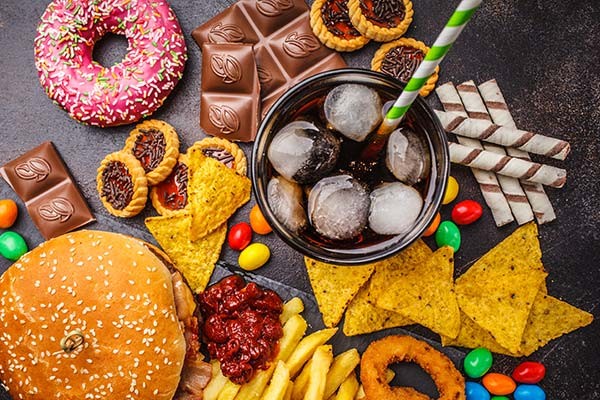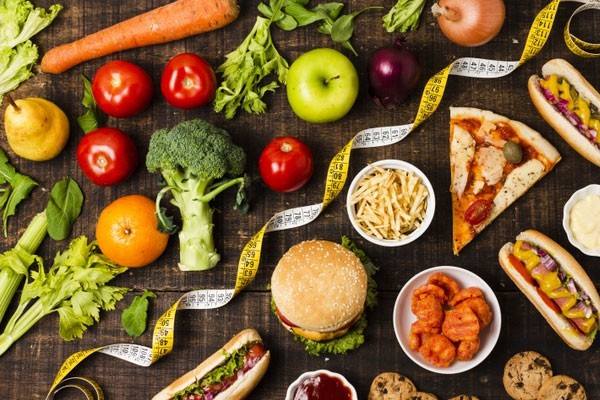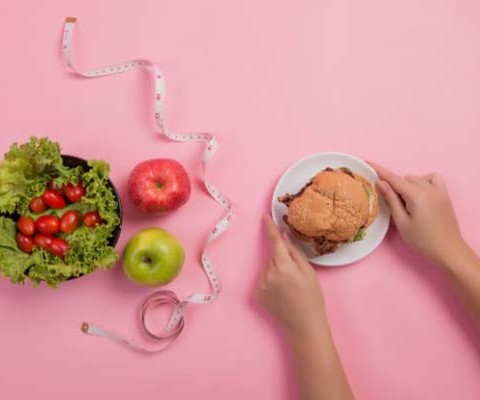Flexible Dieting: The Downsides of Processed Food Intake

Wholefoods vs processed food diets
Following the explosion of the ‘If it fits your macros’ movement, many have been led to believe that the foods consumed in the context of a calorie-controlled diet are completely irrelevant to body composition change or health outcomes. In other words, assuming calories, macronutrients, fibre and sodium intake are matched, the foods consumed to reach these targets don’t matter at all.
As I see it, we currently have a divide within the fitness community. On one end of the spectrum, we have proponents of paleo, plant-based and vegan diets claiming that unprocessed food intake is the holy grail to easy body composition management and optimised health status.
On the other end of the spectrum, we have the devout “flexible dieters” who glorify the incorporation of energy-dense, micronutrient-poor, highly palatable “junk” style foods within their calorie and macronutrient allowance.
So, what’s the low down? Will a Pop-Tart and protein shake diet deliver the same results as one calorically matched with lean meats, fruits, vegetables and whole grains? Sure, putting up photos of the Mars Bar you’re ‘fitting in’ during a fat loss phase will look cool for Instagram, but are you doing yourself and the community a disservice?

Will flexible dieting deliver the same results? Let’s find out.
Let’s investigate this further by looking at a recent study led by Kevin Hall and his team. However, before we get started, it’s important to point out that a causative relationship between processed or junk food intake and human obesity has not been confirmed yet. Additionally, there has yet to be any research study to demonstrate beneficial effects following reducing processed or junk foods in the diet (assuming study conditions are calorically matched).
The study we will discuss investigated 20 adults consuming either a processed (IIFYM type diet) or an unprocessed diet (whole foods) for two weeks. The two diets were matched for calorie content and protein, carb, sugar, fat, sodium, and fibre content. The cool thing about this study (and a reason we can be very confident in the results) is that all participants got to trial both the processed and unprocessed diet arms for two weeks each, in random order.
During each diet condition, the participants were provided with three daily meals and told to eat as much or as little as they wanted. While the calorie and macronutrient composition of the three meals in both diet conditions were matched as described above, they differed quite substantially in where the calories came from, i.e., did the calories come from processed or unprocessed food sources.
The findings: Processed diets cause excess calorie intake and weight gain
When the researchers analysed the data, they noticed that when the participants were exposed to the processed diet condition, they consumed approximately 500 calories more each day than the unprocessed diet condition. During the processed diet condition, the participants also consumed 280 calories more worth of carbohydrates, 230 calories worth of dietary fat, and slightly less protein than in the unprocessed food condition. Something that caught my eye - and to be honest is quite surprising - was the observation that despite the overconsumption of calories when eating processed foods, the participants did not report differences in the pleasantness of the diet conditions, suggesting the differences in energy or calorie intake were not due to greater palatability (i.e., not due to the processed diet tasting nicer).

Additionally (and scary) was the finding that hunger, fullness and meal satisfaction were not different between the diet conditions, even though participants ate MORE during the processed food condition. This is particularly surprising given how many extra calories were consumed in the processed diet condition. Meal eating rate was also considerably faster during the processed diet condition by roughly 10 calories per minute (i.e., junk foods get eaten faster). It may partly explain why the extra calories consumed were not reflected by differences in hunger ratings. Finally, an alternative explanation could be found when consulting the changes in appetite-regulating hormones. In the unprocessed diet condition, the participants showed increases in the appetite-suppressing hormone PYY. They decreased the hunger hormone ghrelin, suggesting that an unprocessed diet is more satiating and suppresses hunger hormones more than a processed diet.
Here’s where the above differences really start to become practically relevant and demonstrate the notable impact of processed food consumption on attaining or maintaining your dream body. During the unprocessed diet condition, participants lost roughly 1kg of body weight. However, during the processed diet condition, the participants actually gained 1kg (remember, this is only over two weeks, so it’s quite substantial!). In addition, body fat was also decreased by 0.3 kg during the unprocessed diet condition but increased by 0.4 kg during the processed diet condition.

Reducing processed food intake may lead to better weight loss results
So, what are the main takeaways from this study?
- Eliminating or reducing processed foods from the diet decreases calorie intake and results in better weight loss.
- A diet high in processed foods increases calorie intake and encourages weight and fat gain.
- Processed foods may lead to weight gain by causing a faster eating rate.
- A diet high in unprocessed foods may support appetite management by increasing levels of PYY (satiety hormone) and decreasing ghrelin levels (hunger hormone).
- Processed diets may be harmful by encouraging the overconsumption of carbohydrates and fat, but not protein.
- A processed diet higher in calories is no more satiating than an unprocessed diet with lower calories.

Jackson Peos
Jackson Peos has completed a PhD at the University of Western Australia, and has a straightforward approach to nutrition and supplements.
He's completed his BSc in Sports Science, and Exercise & Health, and his BSc (Hons) in Exercise Physiology.
References:
- Hall, K., Ayuketah, A., Brychta, R., Cai, H., Cassimatis, T., Chen, K., Chung, S., Costa, E., Courville, A., Darcey, V., Fletcher, L., Forde, C., Gharib, A., Guo, J., Howard, R., Joseph, P., McGehee, S., Ouwerkerk, R., Raisinger, K., Rozga, I., Stagliano, M., Walter, M., Walter, P., Yang, S. and Zhou, M., 2019. Ultra-Processed Diets Cause Excess Calorie Intake and Weight Gain: An Inpatient Randomized Controlled Trial of Ad Libitum Food Intake. Cell Metabolism, 30(1), pp.67-77.e3. https://pubmed.ncbi.nlm.nih.gov/31105044/
Related Blogs

IIFYM: What's it all about?
Posted by Ellie Hearn
Estimated reading time: 3 minutes

Flexible Sleep for Recovery: The 90 Minute Sleep Cycle
Posted by Bulk Nutrients
Estimated reading time: 8 minutes

IIFYM Explained: How Flexible Dieting Leads to Long Term Fat Loss
Posted by Bulk Nutrients
Estimated reading time: 6 minutes














































